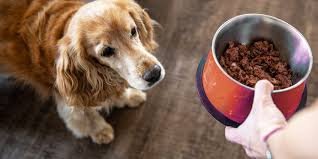
Soft Dog Food for Senior Dogs
As dogs age, their nutritional needs change dramatically. Senior dogs often require diets that are easier to chew and digest, which is why soft dog food becomes an excellent option. Choosing the right food can improve your dog’s quality of life, support their health, and keep them comfortable during their golden years.
This article covers everything you need to know about soft dog food for senior dogs — from benefits and key ingredients to selecting the best products and feeding tips.
Why Choose Soft Dog Food for Senior Dogs?
Older dogs frequently face dental issues such as worn teeth, gum disease, or tooth loss, which make chewing hard kibble difficult or painful. Soft dog food—whether canned, semi-moist, or specially formulated wet food—offers an easier texture for aging mouths.
Soft foods also tend to be more palatable, encouraging better appetite in senior dogs that might otherwise eat less. Additionally, they usually contain higher moisture content, helping keep senior dogs hydrated, which is essential for kidney and urinary tract health.
Key Nutritional Needs of Senior Dogs
When selecting soft food for a senior dog, consider these vital nutritional factors:
- High-Quality Protein: Supports muscle maintenance and overall vitality.
- Lower Calories: Helps manage weight as metabolism slows down.
- Joint Support Ingredients: Nutrients like glucosamine and chondroitin promote joint health.
- Fiber: Aids digestion and prevents constipation, common in older dogs.
- Antioxidants: Support immune function and reduce inflammation.
- Moisture Content: Keeps your dog hydrated and supports kidney health.
Look for senior dog foods with balanced nutrients tailored specifically for aging dogs.
Types of Soft Dog Food Available
There are several types of soft dog food suitable for seniors:
Canned or Wet Food
Canned food has a soft, meaty texture and high moisture content, which makes it gentle on the teeth and easy to digest. Popular brands like Hill’s Science Diet Senior and Blue Buffalo Homestyle Senior offer nutritious canned options for older dogs.
Semi-Moist Food
Semi-moist foods are softer than kibble but firmer than canned. They are often sweetened and flavored to enhance palatability. However, some semi-moist foods contain higher sugar or preservatives, so choose wisely.
Homemade Soft Food
Preparing homemade soft dog food allows control over ingredients and quality. Recipes often include lean meats, cooked vegetables, and grains, pureed or chopped finely for easier consumption.
Benefits of Feeding Soft Food to Senior Dogs
Soft dog food offers several benefits tailored to the needs of older dogs:
- Easier to chew and swallow: Soft texture helps dogs with dental problems.
- Improved hydration: The high moisture content supports overall health.
- Enhanced flavor and aroma: Stimulates appetite in picky or ill seniors.
- Better digestion: Many soft foods are formulated with digestive enzymes and fiber.
- Customizable nutrition: Especially with homemade or specialty soft foods.
What to Avoid in Soft Dog Food for Seniors
While soft foods are beneficial, some contain unwanted additives or ingredients that can harm senior dogs:
- Avoid foods with excessive fillers like corn or wheat gluten.
- Be cautious of artificial colors, flavors, and preservatives.
- Avoid high sodium content, which can strain kidneys.
- Watch for high sugar content in some semi-moist foods.
- Avoid foods lacking clear labeling of ingredients or nutritional balance.
Choosing reputable brands with transparent ingredient lists is essential.
Tips for Transitioning Your Senior Dog to Soft Food
Switching to soft food should be gradual to prevent digestive upset:
- Mix increasing amounts of soft food with the current diet over 7-10 days.
- Observe your dog for any signs of allergy or intolerance.
- Ensure fresh water is always available to complement the moisture in the food.
- Consult your veterinarian for tailored advice on diet changes.
Popular Soft Dog Food Brands for Senior Dogs
Here are some recommended soft dog foods formulated for seniors:
- Hill’s Science Diet Senior Dog Food
- Blue Buffalo Homestyle Recipe Senior
- Royal Canin Aging 12+ Soft Wet Food
- Wellness CORE Grain-Free Senior Canned Dog Food
These brands emphasize balanced nutrition with ingredients supporting joint health, digestion, and overall wellbeing.
Homemade Soft Food Recipes for Senior Dogs
If you prefer homemade meals, here’s a simple recipe to try:
Ingredients:
- 1 cup cooked chicken breast (shredded)
- 1/2 cup cooked sweet potato (mashed)
- 1/4 cup cooked carrots (mashed)
- 1/4 cup cooked peas (mashed)
- 1/2 cup low-sodium chicken broth
Mix all ingredients thoroughly until soft and serve at room temperature. Always consult your vet to ensure homemade meals meet your dog’s specific nutritional needs.
Additional Considerations for Senior Dog Nutrition
Along with food texture, consider supplements like fish oil for omega-3 fatty acids, glucosamine, and probiotics. Always discuss supplements with your veterinarian to avoid interactions or overdosing.
When to Consult a Veterinarian
If your senior dog shows signs of dental pain, weight loss, or digestive problems despite a soft diet, consult your vet immediately. They can recommend specialized diets, perform dental care, or check for underlying illnesses.
Conclusion
Soft dog food is a wonderful option for senior dogs, addressing their changing nutritional and physical needs with easy-to-eat, delicious, and nourishing meals. Whether you choose high-quality canned foods, semi-moist options, or homemade recipes, prioritizing your aging dog’s health and comfort will keep their tail wagging for years to come.





